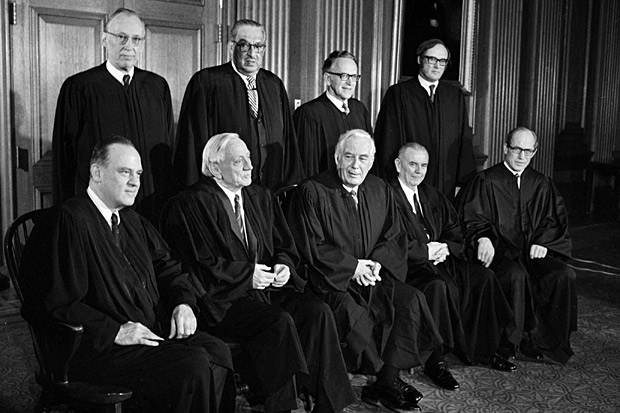Because the Court will not permit legislative compromise on abortion, neither side seeks it. On the contrary, both gravitate to the extremes.
Roe's Progeny: The Abortion Extremes
The kind of extremism on display on the Planned Parenthood videotapes and in the reflexive closing of ranks around the group—whose own leadership has done more to disavow its grotesqueries, or at least the depictions of them, than have its political supporters—is the product of Roe v. Wade, but not for the reasons commonly supposed.
The issue is not simply that Roe legalized abortion. Many states were doing that in the early 1970s anyway. It is that Roe constitutionalized an issue everyone knows but few admit is susceptible of reasonable regulation on the one hand and sensible compromise on the other. The result shoved all parties to extremes at which few previously resided. Those extremes now lie exposed. They are not pleasant to face.
From across the mutual denunciations that characterize the abortion debate, there would seem to be little room for common ground. Little will be found in this space. But the fact is that few pro-choice Americans seriously believe what some pro-choice politicians contend, which is that the right to abortion extends to the moment of birth, while few pro-life Americans would seriously follow where the logic of some pro-life politicians leads, which is that abortion should be prosecuted as first-degree murder from the moment of conception.
That debate will not be settled here. But it may be worth pondering how constitutionalizing the issue so radically deformed the debate that today’s conversation, or lack of it—and it is the inability to discuss the immense moral complexities of abortion that is as coarsening as abortion itself could be—even became thinkable.
The Constitutional process—replete as it is with mechanisms like the separation of powers and the gradual turnover of the Senate—is not conducive to total or sudden victory. It almost always requires compromise and accommodation for achievements to endure.
The casting of abortion in terms of rights exempts it from this process, so it is little surprise that Justice Kennedy’s woeful fear of a “jurisprudence of doubt” notwithstanding, Roe has produced nothing but.
The well documented backlash effect that Supreme Court decisions often trigger galvanizes opposition movements that did not exist before, in extremes to which they would otherwise not have resorted. Because judicial disputes foreclose the path of compromise and operate in absolutes—only one party to a case can win—the losers walk away not merely disappointed but resentful: You want to make it a right without qualification, I’ll restrict it without qualification.
This mode is utterly hostile to both the nuance that characterizes actual human affairs and the prudence that is necessary to deal with it. Mary Ann Glendon, whose pro-life credentials are impeccable, has noted the irony: A woman in America has her rights and little else. Society provides the right to make choices about pregnancy but scant support for the decision. In the hardly sexually repressed societies of Europe, Glendon notes that abortion laws are more balanced—it is allowed up to a certain point and restricted beyond that in a manner that would, under the Roe regime, be regarded as a violation of basic rights—and the support offered for childbearing is more generous.
Politics tends to produce solutions like that. Rights talk, laden with Glendon’s “illusion of absoluteness,” does not. Americans almost certainly would have crafted balanced solutions if forced to grapple squarely with the moral complexities on both sides of the issue. It takes little imagination to conjure wrenching circumstances that would complicate the compromises—accommodations that can be abused, restrictions that can foreclose genuine needs. Such exceptions ought not, as Burke reminds us, be the basis of general rules.
As matters stand, Planned Parenthood can crunch without consequence, and its opponents can talk of criminalization—with the safety net of Roe protecting them from the actual implications of such a policy—the same way.
The constitutionalization of policy disputes creates incentives for these extremes. The Constitutional regime, of which the Court is a part but often understands itself to be the whole, discourages them. These are the results. None of it excuses Planned Parenthood’s behavior. It may help explain how society became inured to it.



